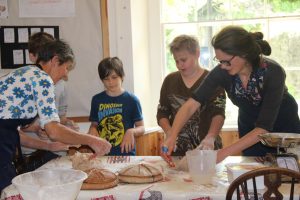
As we have discovered ancient grains of wheat, barley and oats at Ipplepen (see our earlier ‘Cereals’ post), we decided to try to make our own ‘Roman’ bread in a secondary school workshop last week.
Breadmaker Emma Parkin (from Emma’s Bread, Exeter), archaeologist Danielle Wootton and students from Sands School in Ashburton, Devon, spent an afternoon making Roman bread in an experimental archaeology workshop. Our aim was to replicate a loaf of bread discovered in an oven at Pompeii, whilst using flours made from similar grains to the ancient grains we have discovered at the Ipplepen excavation.
We used wholemeal wheat flour and spelt flour and then added a sourdough starter (the starter was made by Emma the night before). This was all mixed together, kneaded and then left to rise for about an hour in the sun. The dough was then kneaded into shape. It was then stamped using clay stamps made by Sands School students. Next, string was tied around the centre. (Roman bread is characteristically ‘pinched’ inwards around the centre, and we think this was achieved by tying string around it). We wondered whether the ‘pinching’ around the centre may have helped it to bake more easily in the middle. Also, by using the same length of string, the breadmaker could ensure the loaves were all about the same size. The string, with a loop tied at the end, was possibly used for carrying or hanging the bread when it had been baked. We could imagine many loaves of bread being carried by their strings on poles back to a busy household- much easier than trying to carry it all under your arms.
The bread was then baked in an oven at a very high temperature for around 40 minutes (the Romans would have used a wood-fired oven, much like wood-fired pizza ovens today).
This was our first attempt- there’s always room for improvement – but we think our bread looks quite a lot like the Roman loaf from Pompeii. It tasted great too! Whilst the bread was quite heavy (we used wholemeal flour and didn’t use yeast to make it rise- only the traditional sourdough starter) we decided it would have been very filling and was probably healthier as there were no preservatives or added sugar. The Sands School students then took their bread into a workshop at Ipplepen Primary School.. details of which will follow in a later post.
Why was the bread stamped?
The stamps in the bread could be used as an ‘advertisement’ for the breadmaker- much like a maker’s mark on various products today. Also, not everyone had their own oven, so people would make the dough and ask the local baker to bake it for them. Stamping bread with your own mark would help you find your bread amongst all the other loaves in the baker’s oven. Our clay stamps worked quite well- we think we will apply a bit of oil to the stamp next time to see if it makes the impression clearer. Local breadmaker Emma is now intrigued with how bread (and breadstamps) were made in ancient times (watch this space…).
12 school pupils directly participated in making the bread and other students (school total 70) came to watch our progress throughout the afternoon and to try the bread at the end of the day.